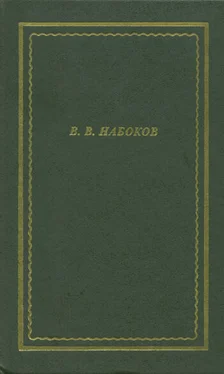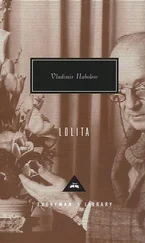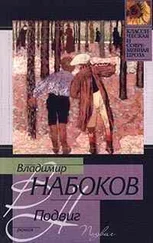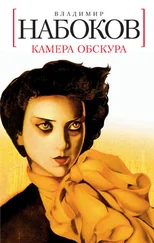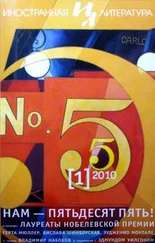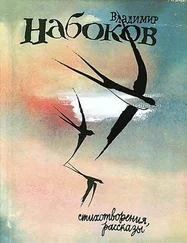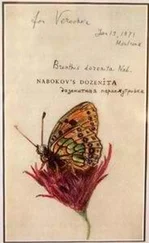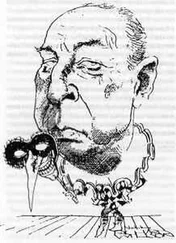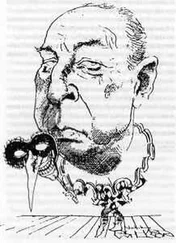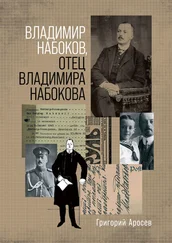to find the true, the ardent core
as doctors of old pictures do
when, rubbing our a distant door
or sooty curtain, they restore
the jewel of a bluish view.
9 марта 1952
Before this house a poplar grows
Well versed in dowsing, I suppose,
But how it sighs! And every night
A boy in black, a girl in white
Beyond the brightness of my bed
Appear, and not a word is said.
On coated chair and coatless chair
They sit, one here, the other there.
I do not care to make a scene:
I read a glossy magazine.
He props upon his slender knee
A dwarfed and potted poplar tree.
And she — she seems to hold a dim
Hand mirror with an ivory rim
Framing a lawn, and her, and me
Under the prototypic tree,
Before a pillared porch, last seen
In July, nineteen seventeen.
This is the silver lining of
Pathetic fallacies: the sough
Of Populus that taps at last
Not water but the author's past.
And note: nothing is ever said.
I read a magazine in bed
Or the Home Book of Verse; and note:
This is my shirt, that is my coat.
But frailer seers I am told
Get up to rearrange a fold.
1952
424. LINES WRITTEN IN OREGON {*}
Esmeralda! Now we rest
Here, in the bewitched and blest
Mountain forests of the West.
Here the very air is stranger.
Damzel, anchoret, and ranger
Share the woodland's dream and danger.
And to think I deemed you dead!
(In a dungeon, it was said;
Tortured, strangled); but instead —
Blue birds from the bluest fable,
Bear and hare in coats of sable,
Peacock moth on picnic table.
Huddled roadsigns softly speak
Of Lake Merlin, Castle Creek,
And (obliterated) Peak.
Do you recognize that clover?
Dandelions, I'or du pauvre? [17]
(Europe, nonetheless, is over).
Up the turf, along the burn,
Latin lilies climb and turn
Into Gothic fir and fern.
Cornfields have befouled the prairies
But these canyons laugh! And there is
Still the forest with its fairies.
And I rest where I awoke
In the sea shade — l'ombre glauque [18]—
Of a legendary oak;
Where the woods get ever dimmer,
Where the Phantom Orchids glimmer —
Esmeralda, immer, immer. [19]
<20 июня> 1953
I have followed you, model,
in magazine ads through all seasons,
from dead leaf on the sod
to red leaf on the breeze,
from your lily-white armpit
to the tip of your butterfly eyelash,
charming and pitiful,
silly and stylish.
Or in kneesocks and tartan
standing there like some fabulous symbol,
parted feet pointing outward
— pedal form of akimbo.
On a lawn, in a parody
Of Spring and its cherry tree,
near a vase and a parapet,
virgin practicing archery.
Ballerina, black-masked,
near a parapet of alabaster.
«Can one — somebody asked —
rhyme „star“ and „disaster“?»
Can one picture a blackbird
as the negative of a small firebird?
Can a record, run backward,
turn «repaid» into «diaper»?
Can one marry a model?
Kill your past, make you real, raise a family,
by removing you bodily
from back numbers of Sham?
<8 октября> 1955
426. ON TRANSLATING «EUGENE ONEGIN» {*}
1
What is translation? On a platter
A poet's pale and glaring heard,
A parrot's screech, a monkey's chatter,
And profanation of the dead.
The parasites you were so hard on
Are pardoned if I have your pardon,
O, Pushkin, for my stratagem:
I traveled down your secret stem,
And reached the root, and fed upon it;
Then, in a language newly learned,
I grew another stem and turned
Your stanza patterned on a sonnet,
Into my honest roadside prose —
All thorn, but cousin to your rose.
2
Reflected words can only shiver
Like elongated lights that twist
In the black mirror of a river
Between the city and the mist.
Elusive Pushkin! Persevering,
I still pick up Tatiana's earring,
Still travel with your sullen rake.
I find another man's mistake,
I analyze alliterations
That grace your feasts and haunt the great
Fourth stanza of your Canto Eight.
This is my task — a poet's patience
And scholiastic passion blent:
Dove-droppings on your monument.
How mobile is the bed on these
nights of gesticulating trees
when the rain clatters fast,
the tin-toy rain with dapper hoof
trotting upon an endless roof,
traveling into the past.
Upon old roads the steeds of rain
Slip and slow down and speed again
through many a tangled year;
but they can never reach the last
dip at the bottom of the past
because the sun is there.
1956
428. THE BALLAD OF LONGWOOD GLEN {*}
That Sunday morning, at half past ten,
Two cars crossed the creek and entered the glen.
In the first was Art Longwood, a local florist,
With his children and wife (now Mrs. Deforest).
In the one that followed, a ranger saw
Art's father, stepfather and father-in-law.
The three old men walked off to the cove.
Through tinkling weeds Art slowly drove.
Fair was the morning, with bright clouds afar.
Children and comics emerged from the car.
Silent Art, who could state at a thing all day,
Watched a bug climb a stalk and fly away.
Pauline had asthma, Paul used a crutch.
They were cute little rascals but could not run much.
«I wish», said his mother to crippled Paul,
«Some man would teach you to pitch that ball».
Silent Art took the ball and tossed it high.
It stuck in a tree that was passing by.
And the grave green pilgrim turned and stopped.
The children waited, but no ball dropped.
«I never climbed trees in my timid prime»,
Thought Art; and forthwith started to climb.
Now and then his elbow or knee could be seen
In a jigsaw puzzle of blue and green.
Up and up Art Longwood swarmed and shinned,
And the leaves said yes to the questioning wind.
What tiaras of gardens! What torrents of light!
How accessible ether! How easy flight!
Читать дальше
